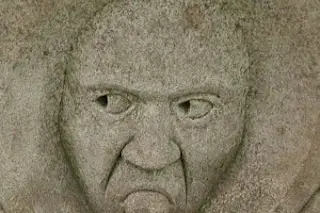Image: Flickr/Anne-Lise HeinrichsPrevious studies have hinted that our political views may stem from unconscious responses we have to intense stimuli, like disgusting pictures. To directly test this hypothesis, these scientists scanned people's brains while showing them regular or disgusting images (be sure to check out the horrifying list below...if you dare). It turns out that the brain's response to disgusting images could accurately predict whether a person is liberal or conservative. But, even more surprisingly, the subjects' voiced opinions about the images did *not* correlate with their ideologies, suggesting that this response is hard-wired and not under our conscious control. Perhaps we are all robots after all...Nonpolitical Images Evoke Neural Predictors of Political Ideology "Political ideologies summarize dimensions of life that define how a person organizes their public and private behavior, including their attitudes associated with sex, family, education, and personal autonomy. Despite the abstract nature of such sensibilities, fundamental ...
Ever wonder why someone becomes a Republican? Hint: it's disgusting.
Discover how political views and unconscious responses reveal surprising insights into our ideology. Uncover the neural predictors of beliefs!
More on Discover
Stay Curious
SubscribeTo The Magazine
Save up to 40% off the cover price when you subscribe to Discover magazine.
Subscribe













